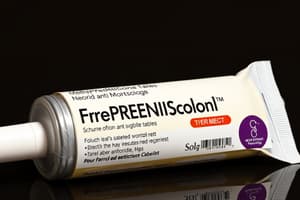Podcast
Questions and Answers
What class of medication is Methylprednisolone?
What class of medication is Methylprednisolone?
- Analgesic
- Antibiotic
- Corticosteroid (correct)
- Antiviral
What is the mechanism of action of Methylprednisolone?
What is the mechanism of action of Methylprednisolone?
Potent synthetic glucocorticoid that suppresses acute and chronic inflammation and causes smooth muscle relaxation.
Which of the following are indications for Methylprednisolone? (Select all that apply)
Which of the following are indications for Methylprednisolone? (Select all that apply)
- Sepsis
- Acute spinal cord trauma (correct)
- Fungal infections
- Bronchodilator for unresponsive asthma (correct)
Which of the following is a contraindication for Methylprednisolone?
Which of the following is a contraindication for Methylprednisolone?
What are some adverse reactions of Methylprednisolone? (Select all that apply)
What are some adverse reactions of Methylprednisolone? (Select all that apply)
What drug interactions are associated with Methylprednisolone?
What drug interactions are associated with Methylprednisolone?
What is the administration dosage for Methylprednisolone?
What is the administration dosage for Methylprednisolone?
What is the generic name for Methylprednisolone?
What is the generic name for Methylprednisolone?
Flashcards are hidden until you start studying
Study Notes
Methylprednisolone Overview
- Classifies as a corticosteroid, notable for its anti-inflammatory properties.
- Functions primarily as a potent synthetic glucocorticoid.
Mechanism of Action
- Suppresses both acute and chronic inflammation effectively.
- Induces smooth muscle relaxation, contributing to therapeutic effects in respiratory conditions.
Indications for Use
- Administered in cases of acute spinal cord trauma to minimize secondary injury.
- Utilized for managing anaphylaxis by combating severe allergic reactions.
- Acts as a bronchodilator for patients with unresponsive asthma or COPD.
- Recommended for suspected Addisonian crisis to counteract adrenal insufficiency.
Contraindications
- Not suitable for use in premature infants due to potential complications.
- Should not be administered in patients with active fungal infections.
- Contraindicated in cases of gastrointestinal bleeding and active sepsis.
Adverse Reactions
- Common adverse effects include headaches and hypertension, requiring monitoring during treatment.
Drug Interactions
- May interact with hypoglycemic agents, potentially altering their effectiveness.
- Can increase the risk of hypokalemia, necessitating assessment of electrolyte levels.
Administration Guidelines
- Dosage for both adults and pediatrics is 2 mg/kg, with a maximum dose of 60 mg administered intravenously or intraosseously.
Generic Name
- Known generically as Solu-Medrol, widely recognized in medical settings.
Studying That Suits You
Use AI to generate personalized quizzes and flashcards to suit your learning preferences.




